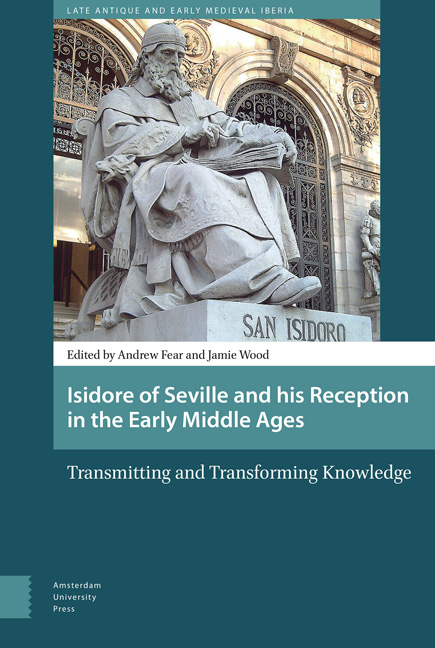 Isidore of Seville and his Reception in the Early Middle Ages
Isidore of Seville and his Reception in the Early Middle Ages Book contents
- Frontmatter
- Contents
- Preface: Paul Fouracre, University of Manchester
- 1 Introduction
- 2 A Family Affair: Leander, Isidore and the Legacy of Gregory the Great in Spain
- 3 Variations on a Theme: Isidore and Pliny on Human and Human-Instigated Anomaly
- 4 Putting the Pieces Back Together: Isidore and De Natura Rerum
- 5 The Politics of History-Writing: Problematizing the Historiographical Origins of Isidore of Seville in Early Medieval Hispania
- 6 Isidorian Texts in Seventh-Century Ireland
- 7 Isidore of Seville in Anglo-Saxon England: The Synonyma as a Source of Felix’s Vita S. Guthlaci
- 8 Hispania et Italia: Paul the Deacon, Isidore, and the Lombards
- 9 Rylands MS Latin 12: A Carolingian Example of Isidore’s Reception into the Patristic Canon
- 10 Adoption, Adaptation, & Authority: The Use of Isidore in the Opus Caroli
- Abbreviations
- Index
3 - Variations on a Theme: Isidore and Pliny on Human and Human-Instigated Anomaly
Published online by Cambridge University Press: 12 December 2020
- Frontmatter
- Contents
- Preface: Paul Fouracre, University of Manchester
- 1 Introduction
- 2 A Family Affair: Leander, Isidore and the Legacy of Gregory the Great in Spain
- 3 Variations on a Theme: Isidore and Pliny on Human and Human-Instigated Anomaly
- 4 Putting the Pieces Back Together: Isidore and De Natura Rerum
- 5 The Politics of History-Writing: Problematizing the Historiographical Origins of Isidore of Seville in Early Medieval Hispania
- 6 Isidorian Texts in Seventh-Century Ireland
- 7 Isidore of Seville in Anglo-Saxon England: The Synonyma as a Source of Felix’s Vita S. Guthlaci
- 8 Hispania et Italia: Paul the Deacon, Isidore, and the Lombards
- 9 Rylands MS Latin 12: A Carolingian Example of Isidore’s Reception into the Patristic Canon
- 10 Adoption, Adaptation, & Authority: The Use of Isidore in the Opus Caroli
- Abbreviations
- Index
Summary
It is impossible to say for certain whether Isidore actually read Pliny’s Natural History at first hand. As anyone who has ever considered the question of Isidore's (or indeed Pliny’s) sources knows only too well, it can be almost impossible to tell what the authors of encyclopaedic and compilatory works such as the Natural History or the Etymologies, reliant as they were on multiple secondary sources, used directly and which at one or more removes. Material deriving ultimately from Pliny permeates the entire Etymologies; whether it was sourced at first hand or derived from an intermediary is impossible to say for certain. All we can be sure of is a pervasive Plinian flavour or echo to much of Isidore's material. Threads of thought, recognizable from a reading of Pliny, recur in the books of the Etymologies. This chapter will examine one such thread, human anomaly. The aim is not primarily to locate inspiration from Pliny in Isidore but to consider how each treated an idea of central importance to their respective worldviews.
The animal kingdom for Pliny occupies five out of 37 books of his Historia Naturalis (HN), while for Isidore two of the twenty books of the Etymologies (Etym.) cover similar ground. In both writers, the human animal has a special relationship with the creative divinity, in Pliny's case Stoic nature and in Isidore's the Christian creator God. For Pliny, indeed, the rest of creation is geared for the most part towards man's needs (HN 7.3). For Isidore, who implicitly recalls the Stoic pantheistic view of nature at the beginning of Etym. 11, the human body uniquely is raised upright for contemplation of the Creator (11.1.5); another classical topos, specifically referenced in this case to lines quoted from the beginning of Ovid's Metamorphoses (Met. 1.84); while his mind (mens), the superior part of the soul (11.1.11), is the cause of his being said to be the image of God (imago dei).
For the Christian writer, then, the human animal is of dual aspect: a body formed from the soil but raised upright from the soil to face upward, and a soul.
- Type
- Chapter
- Information
- Isidore of Seville and his Reception in the Early Middle AgesTransmitting and Transforming Knowledge, pp. 57 - 74Publisher: Amsterdam University PressPrint publication year: 2016
- 1
- Cited by


